When Nemonte Nenquimo, a member of the Waorani people, was growing up in Ecuador’s Amazon rainforest, white people were a rarity. One missionary lived in the village, and she exerted control over some of the Waorani people with threats of god, shame around nakedness and traditional ways, and selectively providing medicines. Planes would fly in with more white people who came looking to expand extractive logging and oil industries. Nenquimo always rushed to see the planes land as a child, though at the time there was no way for her to know just how much these interactions would shape her personal life and her work protecting her people’s land.
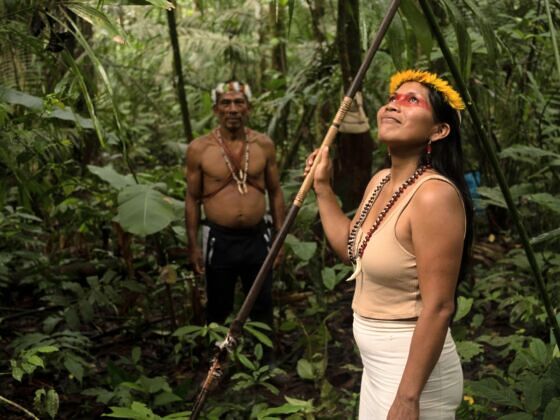

Protecting the Amazon: Activist Nemonte Nenquimo on Her New Book ‘We Will Be Jaguars’
The Amazon rainforest and the Indigenous peoples who have historically called it home face a litany of threats from governments and big industry. Those same threats are increasing the impact of climate change — a problem that will only exacerbate the challenges to protect the land in a vicious circle.
Nenquimo is a climate change activist and cofounded the Ceibo Alliance, which has members of the Waorani, Kofan, Secoya, and Siona peoples. She is also a cofounder of Amazon Frontlines with her husband Mitch Anderson. The organization has both Indigenous and Western members and was founded in 2011 to promote local-led conservation in the Amazon. Nenquimo helped lead a court case to protect more than 500,000 million acres of rainforest that the Ecuadorian government was attempting to auction off to oil companies, with precedent to protect millions more. Her work is widely recognized, and Amazon Frontlines won the Goldman Environmental Prize in 2020 and the 2024 Conrad N. Hilton Humanitarian Prize — in the case of the latter, it was the first organization of Indigenous and Western activists to win the largest annual humanitarian award in the world.
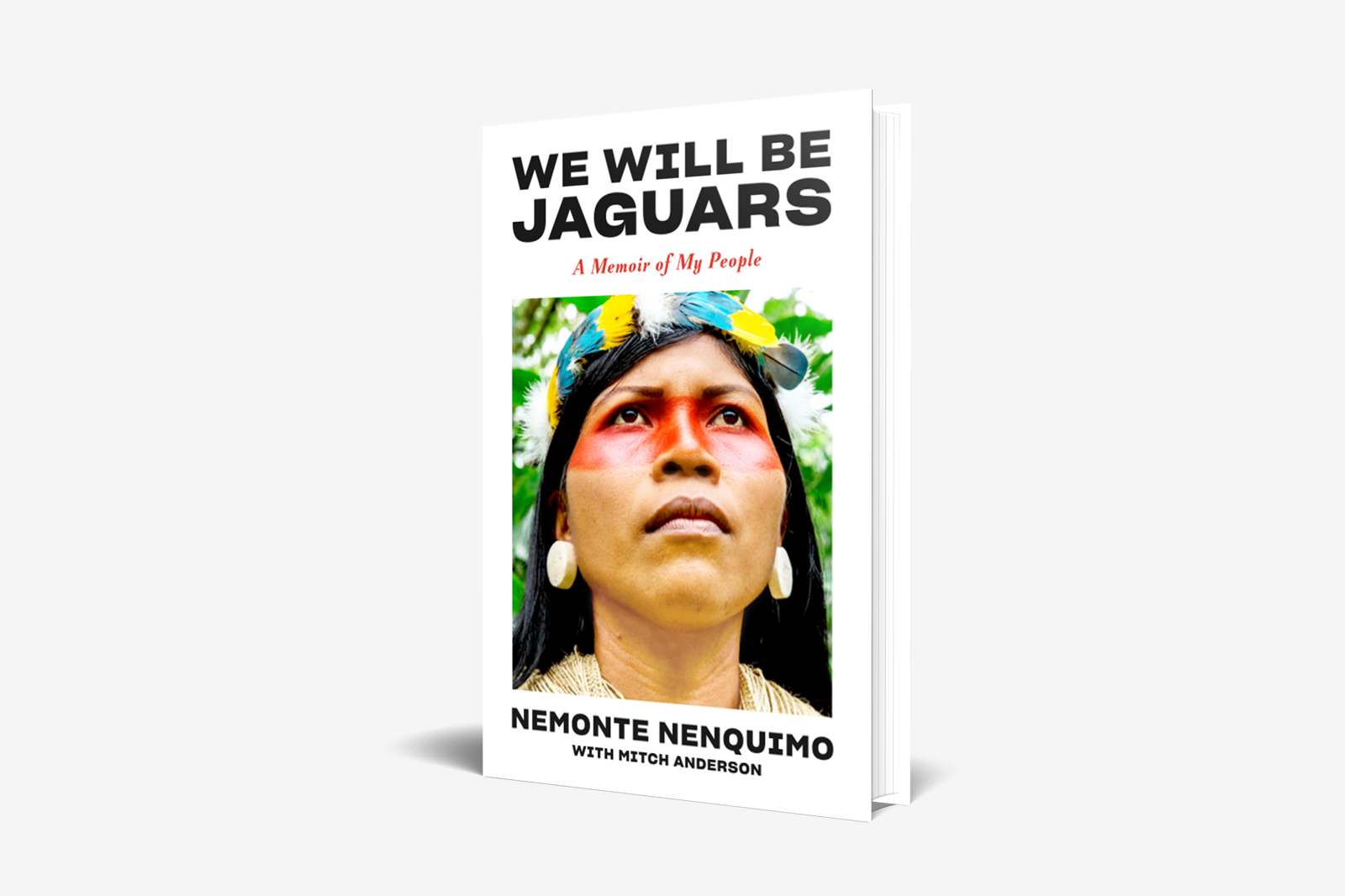
Photo: Amazon Frontlines
Nenquimo’s new book, We Will Be Jaguars (Abrams Press), cowritten with Anderson, tells her story and the oral stories of her people. It starts with her childhood living in a village called Toñampare with 30 to 40 families and one white person living with them: a stern and racist missionary named Rachel Saint trying to “save” the tribe through god. Nenquimo recalls personal traumas of being sexually abused while studying with a missionary group, and the devastation to her people’s way of life she saw when she returned. The book also records long-held oral traditions, and recounts her meeting with Anderson, who was building rainwater catchment systems in the Amazon, and the work they’ve done together.
The constant threat of industry, government, and climate change are present throughout.
“I decided to write my story in a book because I know that we’re all connected to Mother Earth,” Nenquimo told me over a video call, with Anderson translating from Spanish. “We’re all connected in our actions, and what people do far away affects what happens in my lands and in my territory. And what happens in my lands and my territory and my home can affect people far away.”
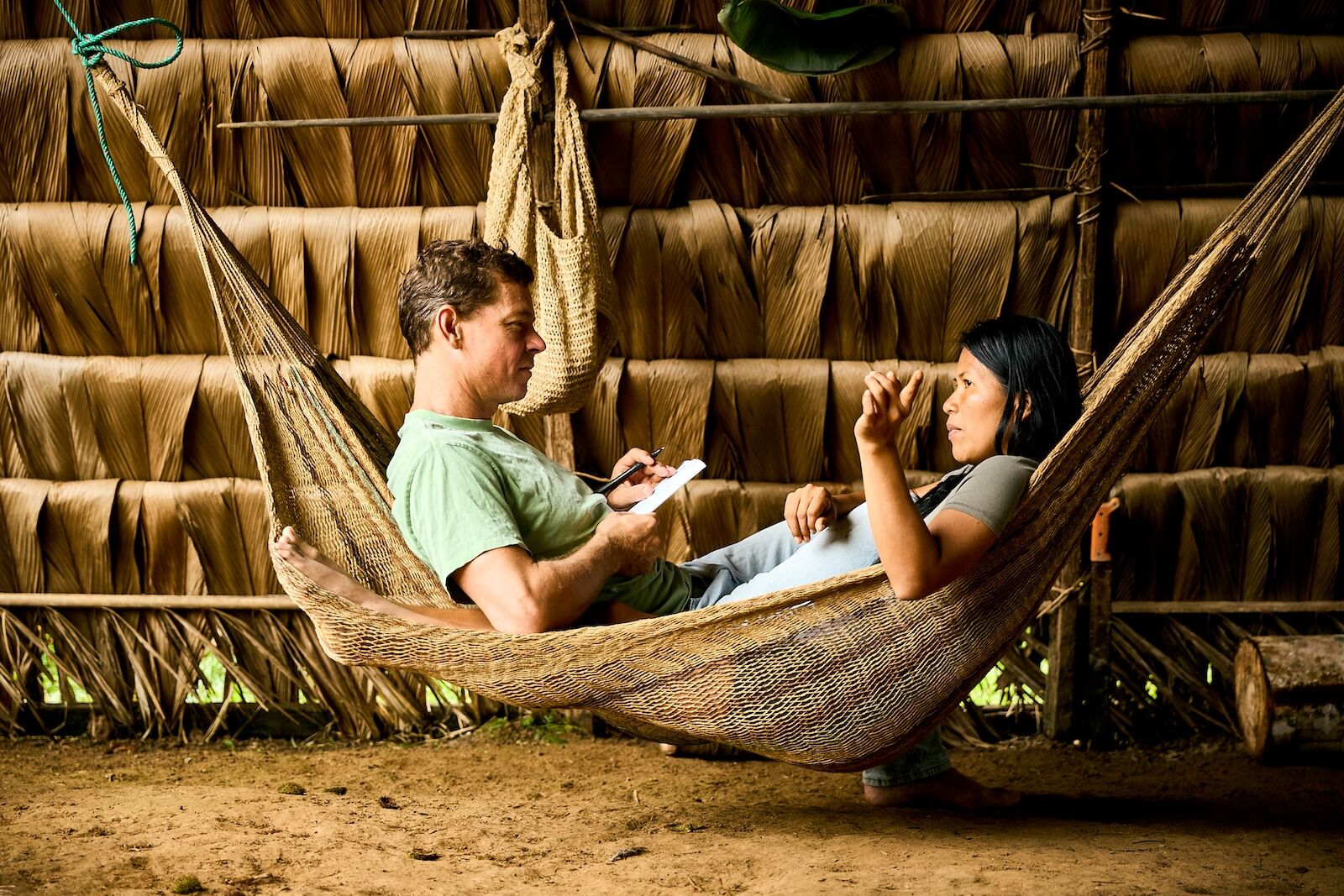
Nemonte Nenquimo and Mitch Anderson. Photo: Christopher Fragapane/Amazon Frontlines
Here, Nenquimo explains recording oral traditions, her work to protect the Amazon and Indigenous cultures, and what she has hope for in the future.
This interview has been edited for length and clarity. Answers were translated from Spanish during the call by Mitch Anderson.
Matador Network: From the start, the book acknowledges that the stories in your oral tradition are sacred. What led you to believe putting them down in a book is the right choice?
Nemonte Nenquimo: We didn’t write this book because we dreamed of writing a book. We are activists, we have been working for many years with different peoples and my people. We’ve been protecting our lands and defending our lands against external threats for hundreds of years. Over the last decade, these threats have been intensifying, and working with Mitch, cofounders of Amazon Frontlines, and the Ceibo Alliance, we’ve worked together with Indigenous nations across the Upper Amazon to win big battles against the mining industry, against the oil industry, against the government.
After winning these big battles to protect our lands, we realized the threats continued unrelenting. My father and our elders are wise and they’ve taught me that the outside world destroys what it doesn’t understand. Our book is not a book like that of an anthropologist asking questions every day who comes from outside. With my dad, my family, and our elders, we thought that putting our stories into a book would be an act of resistance — a strategy that could help the world understand who we are as Indigenous peoples, our connection to our forests, and why the outside world shouldn’t destroy it.
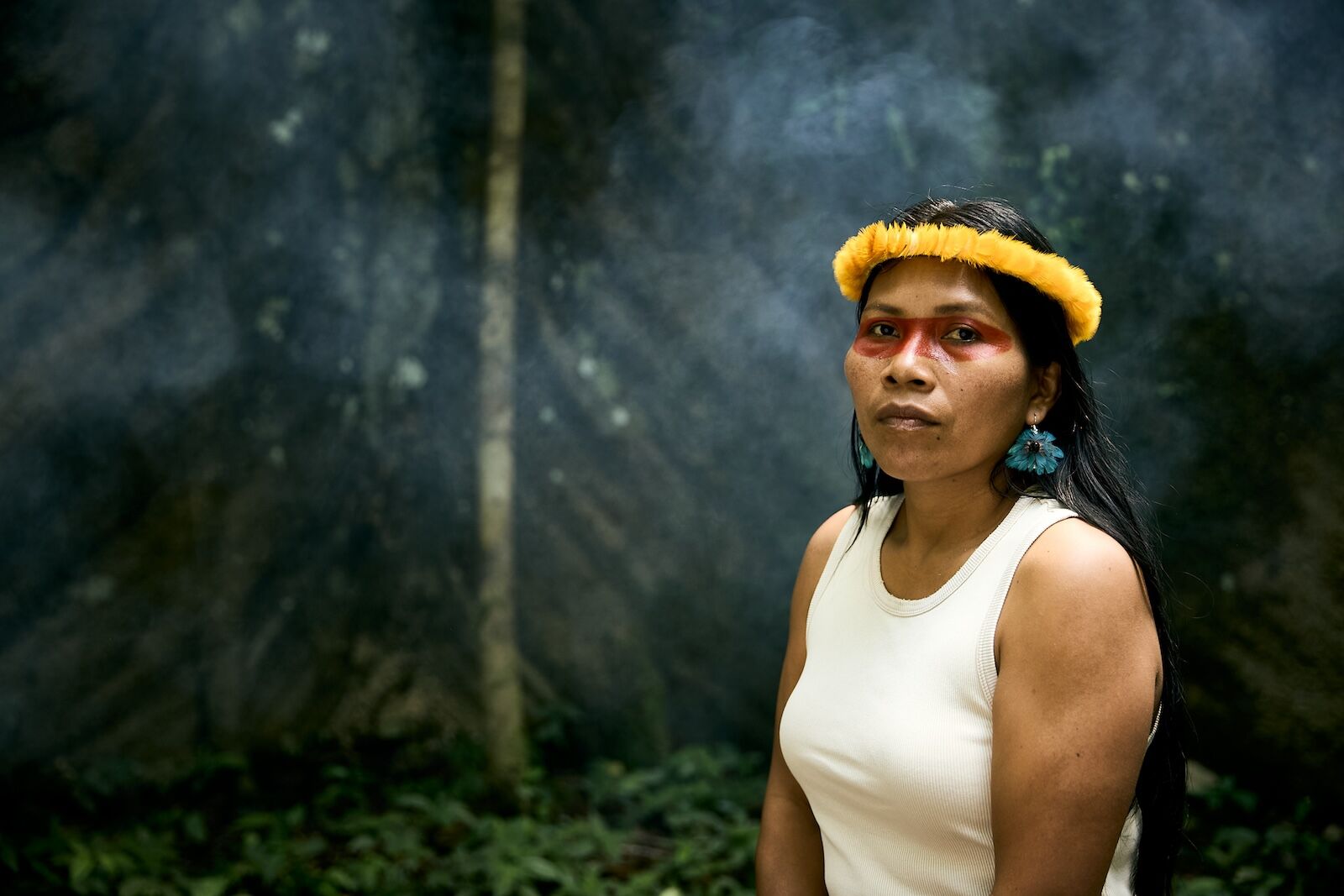
Photo: Christopher Fragapane/Amazon Frontlines
For the Waorani, we remain unconquered for thousands of years because we live in the heart of the Amazon and we were always careful to not walk the same trail twice. We would always walk a trail and then we would come back along a different trail. That was my dad’s advice to me when we wrote my story, our story, down: to make sure that I wasn’t walking the same trail and exposing my people or ourselves to potential dangers.
In the process of writing my story down and discovering the story that needed to be told, it was also powerful and healing. It’s a love story about and to the land, to my people.
What has the response to your work and to your book been from the Waorani people?
This is the first book written by our people, written by an Indigenous woman, sharing my perspective, my voice, my understanding of the world and how my people live in the forest, how we perceived the outside world’s invasion of our lands. They’re proud because it’s a story that honors our culture, love for the land, and our ancestors.
The book is deeply personal as well. How do you feel that your personal story helps people understand the bigger problems happening in the Amazon?
Because Mother Earth is suffering, because Mother Earth is wounded, because Mother Earth is carrying a tremendous amount of pain. Because the missionaries invaded our lands and caused harm, because the oil companies invaded our lands and caused harm, because the government has invaded our lands and caused harm, and because women are the earth. Our bodies are made from the earth. We are the life givers, just as the earth is the life giver.
And because I suffered violence, trauma, and sexual abuse, I needed to share that pain. Because it’s the same pain that Mother Earth is feeling.
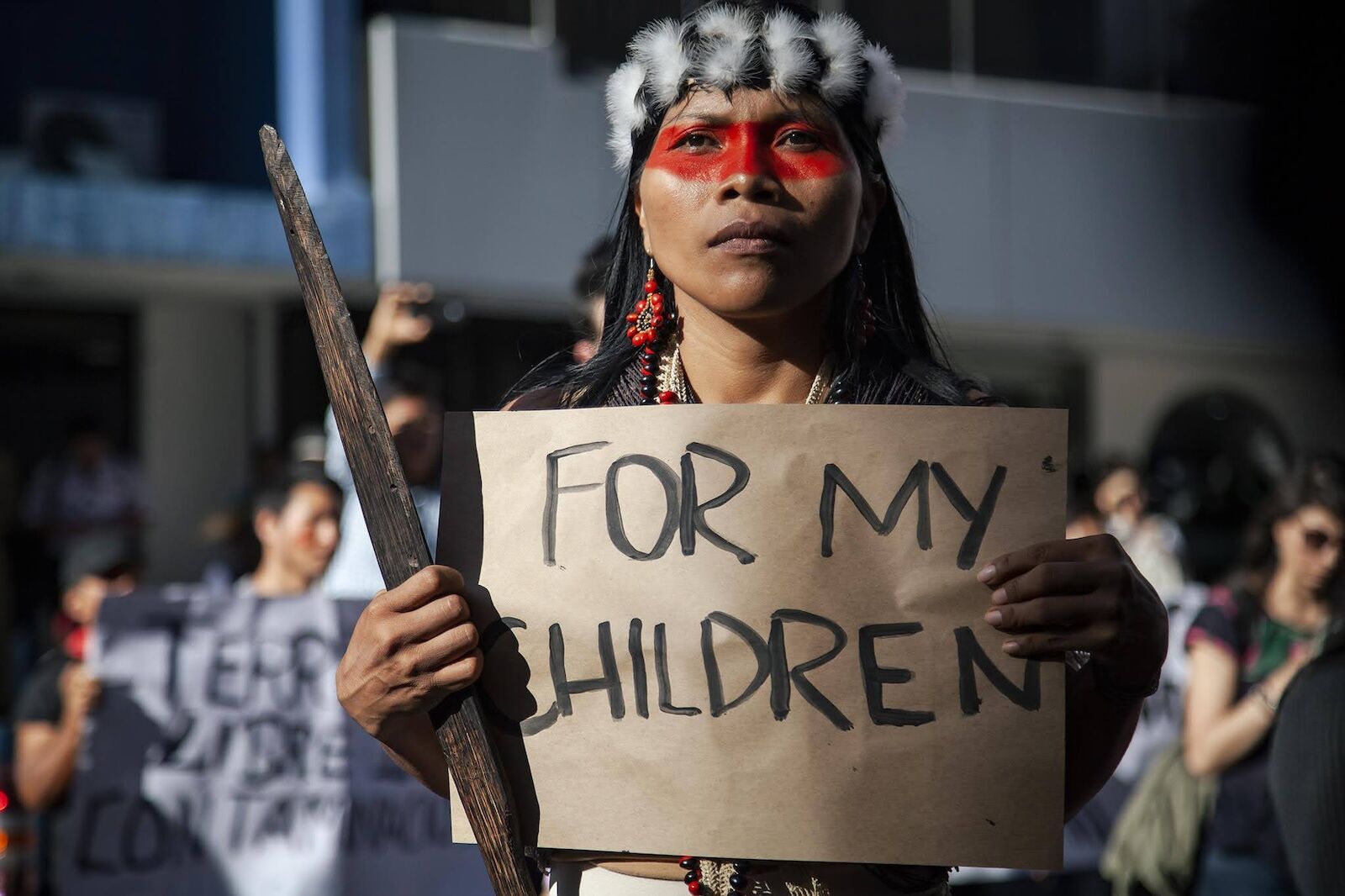
Photo: Amazon Frontlines
To be a leader, one needs to have courage, one needs to be without fear. And because ultimately I wanted to communicate our lived experience as Indigenous peoples with the world truthfully and honestly.
The fight to protect the land has changed over time. Can you explain those changes?
It is not the same as before. Before, it was a small threat. They killed with the spear if it entered their territory. But now, we Indigenous peoples are the solution to climate change. We don’t destroy, we don’t pollute, we are our home. We are in spiritually in contact with Mother Nature. What is now a threat is outside. It is the system of the world, of the economy.
From the very beginning, when there was an external threat to our people’s lands and our territories, our ancestors went to war. We brought our spears into war and into battle to protect our lands. But what we realize now is the scale of the threats, the nature of the global economic system, is such that spears are not enough to protect our land. And so the decision to tell our story and write it in a book is an act of resistance, a way of building a movement.
It’s a way of sparking awake consciousness worldwide. It’s a way of ensuring that many across the world will have our backs because we’ve shared with those that want to destroy us who we are and our connection with the land and our claim over this territory. There’s no change, no contradiction, in the essential wisdom. What there is is us innovating and adapting our strategies to protect what we love.
What do you see as the defining approach Westerners took to “save” the Amazon and the people who live there?
Many times, evangelicals, oil companies, government officials, and NGOs come and see the Indigenous peoples as, “Oh, poor thing, the Indigenous people have no knowledge, we can help.” They put their ego, their arrogance toward the Indigenous people without understanding. They suppose that Indigenous peoples need to be saved and that they can’t save themselves.
The mentality of the savior is not a curious mentality. They’re not interested in asking questions or trying to understand the visions of the people, what well-being and health mean to the people. What they’re interested in doing is imposing their own project or their own agenda.
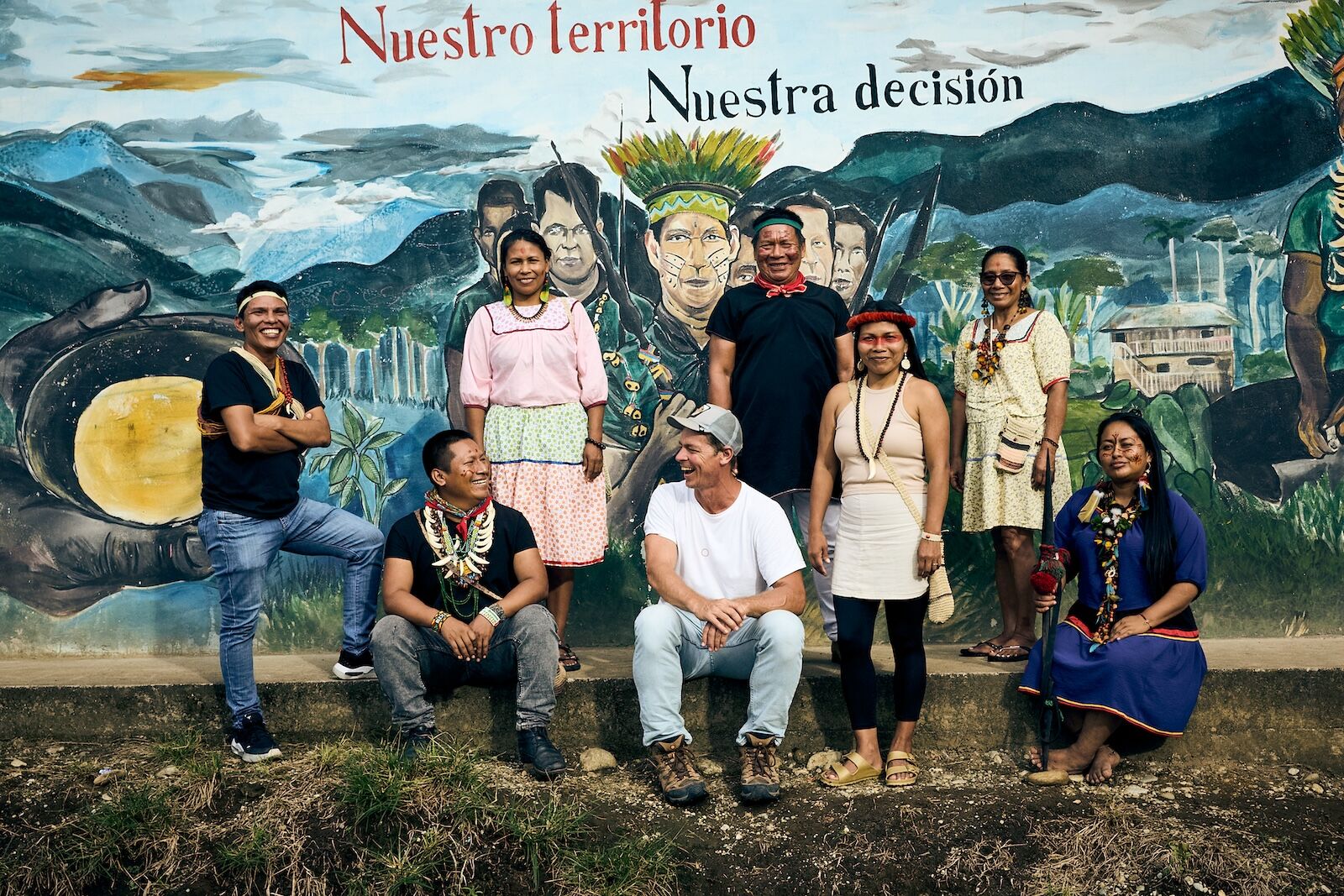
Mitch Anderson and Nemonte Nenquimo, center, with partners from Ceibo Alliance. Photo: Christopher Fragapane/Amazon Frontlines
The relationship with the team from Amazon Frontlines, who are also outsiders from around the world, was very different, because they didn’t start with an arrogant, superior mentality. They started with a big heart and a big desire to listen and to learn, and figure out how to be useful and meaningful and supportive in their work to protect Indigenous cultures and Indigenous territory against the threats that come from the very system where the outsiders come from. It’s been very powerful. With that approach to collaboration, as opposed to imposition, we’ve been able to create really big dreams, very formidable strategies, and a lot of impact and benefit to communities, the rivers, to the forest.
There’s so much extraction, of people and the land, that runs through the book. How have things changed in recent years?
The first thing that’s important is that through collective struggle — through the work of Ceibo Alliance and Amazon Frontlines, through the wisdom and power of the elders, the Waorani people, and the women — we were able to win an important battle against the government and the oil industry to protect 500,000 acres of Waorani territory and set a legal precedent to protect 7 million acres more.
And that’s powerful, and that is a reason to hope, because we provided a tool for Indigenous peoples to protect their land. We’ve also won a national referendum to keep the oil in the ground in Yasuni National Park, which is also another powerful sign of hope. But at the same time, over the last years, the government and the oil industry and the mining industry is doubling down on extraction.
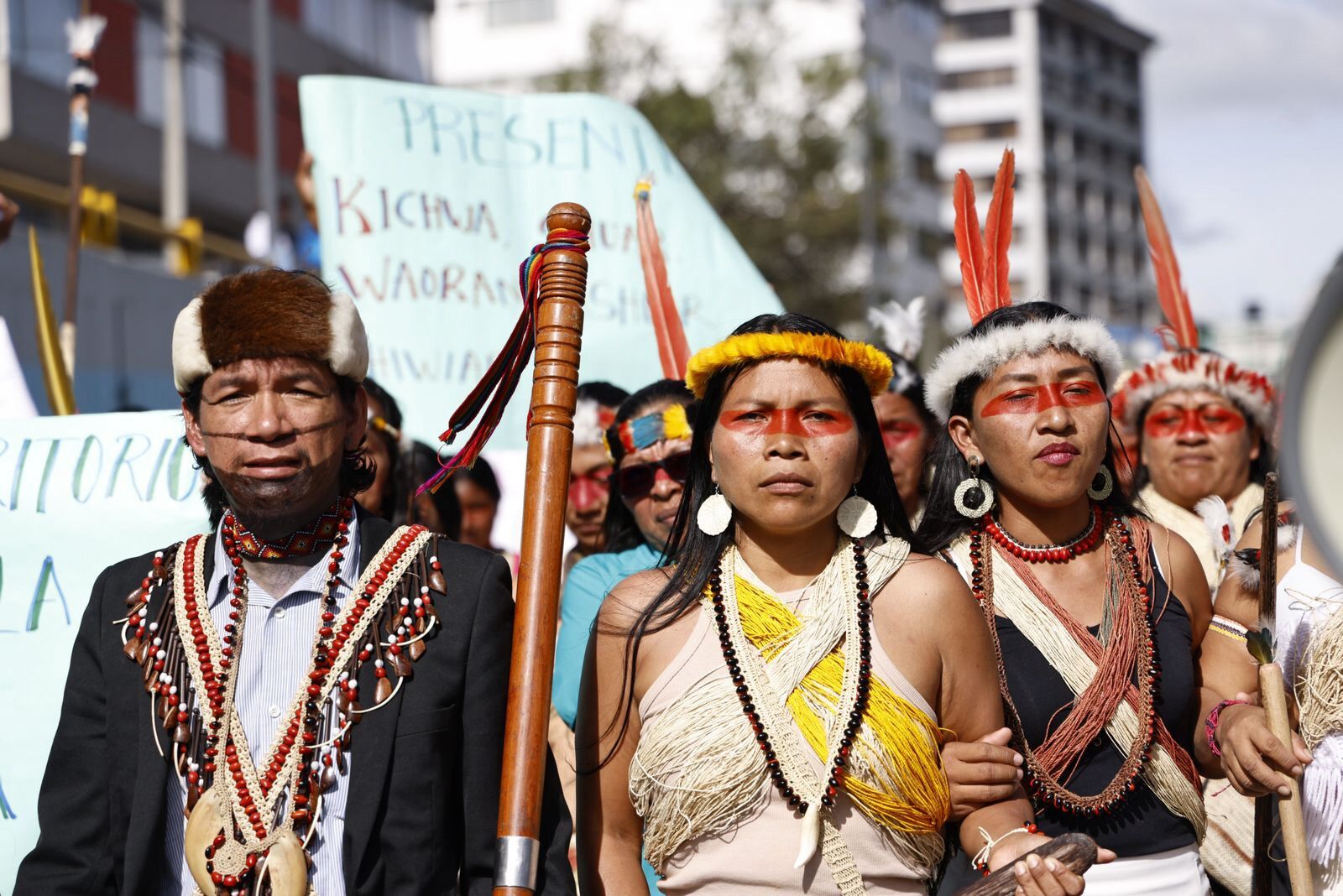
Photo: Karen Toro/Amazon Frontlines
The threats continue to intensify. And as Indigenous peoples who call and consider the Amazon our home, we’re connected to the forest from the moment we’re born and into the afterlife. The forest is our pharmacy, it’s our market, it’s our hardware store, it’s our source of life. We’re going to continue defending our home from these threats.
And the reason why we’ve written this book, We Will Be Jaguars, is because we will be jaguars. It’s because we realize that these threats are systemic and they’re coming from a deep place of spiritual disconnection with Mother Earth.
The world of the cities, the people of the cities, are disconnected from the land spiritually, and are desiring to accumulate and accumulate and accumulate more and more consumption, consumption, consumption. And that is driving these threats to our forests and to our homes. And so we’ve written this book as a love letter to Mother Earth, and as a wake up call to the world that we need to spiritually reconnect, love, and honor the life giving Mother Earth.
Otherwise, we’re going to continue to threaten her, which will threaten our very survival.
Amazon Frontlines was recently awarded the Hilton Humanitarian Prize. What does that say about the state of the movement and where things are headed?
We deserve this recognition. Indigenous peoples for centuries have been defending our lands, suffering injustices, protecting our rivers and our forests. We deserve this prize. Indigenous peoples need to be recognized, need to be seen, need to be uplifted. We deserve 20 more prizes. We deserve all the prizes in the world for everything that we’re doing to protect our homes.
And for us, what we’re going to do with this recognition is continue to grow our work, continue to protect our territories, continue to protect our land. And we’re going to work to wake up the world so that we don’t destroy the only mother that we have.
For more, We Will Be Jaguars is available now on Amazon and Bookshop.